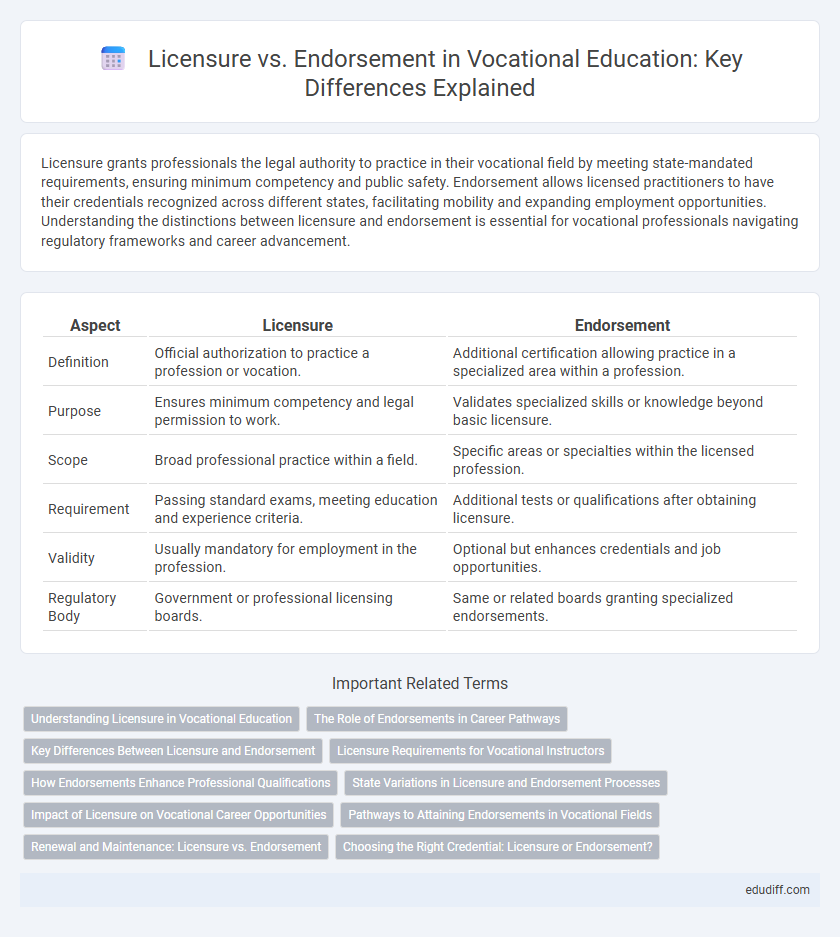Licensure grants professionals the legal authority to practice in their vocational field by meeting state-mandated requirements, ensuring minimum competency and public safety. Endorsement allows licensed practitioners to have their credentials recognized across different states, facilitating mobility and expanding employment opportunities. Understanding the distinctions between licensure and endorsement is essential for vocational professionals navigating regulatory frameworks and career advancement.
Table of Comparison
| Aspect | Licensure | Endorsement |
|---|---|---|
| Definition | Official authorization to practice a profession or vocation. | Additional certification allowing practice in a specialized area within a profession. |
| Purpose | Ensures minimum competency and legal permission to work. | Validates specialized skills or knowledge beyond basic licensure. |
| Scope | Broad professional practice within a field. | Specific areas or specialties within the licensed profession. |
| Requirement | Passing standard exams, meeting education and experience criteria. | Additional tests or qualifications after obtaining licensure. |
| Validity | Usually mandatory for employment in the profession. | Optional but enhances credentials and job opportunities. |
| Regulatory Body | Government or professional licensing boards. | Same or related boards granting specialized endorsements. |
Understanding Licensure in Vocational Education
Licensure in vocational education certifies that an individual meets the mandatory standards set by regulatory bodies to practice a specific trade or profession legally. It ensures competency and safety in fields such as healthcare, electrical work, and cosmetology by requiring candidates to pass standardized exams and fulfill practical training hours. Understanding licensure requirements is crucial for vocational students to gain legal authorization and enhance their employability in specialized industries.
The Role of Endorsements in Career Pathways
Endorsements play a critical role in career pathways by allowing vocational professionals to specialize and demonstrate expertise in specific skill areas, enhancing employability and job mobility. While licensure certifies the minimum competency required to practice legally, endorsements provide an added layer of qualification that aligns closely with industry demands and evolving job markets. These targeted recognitions enable workers to access advanced opportunities and meet employer expectations in specialized vocational fields.
Key Differences Between Licensure and Endorsement
Licensure is a mandatory certification issued by a governing body that legally authorizes an individual to practice a specific vocation, ensuring compliance with established standards and regulations. Endorsement is an optional credential that recognizes specialized skills or additional qualifications beyond the basic license, often required to expand practice scope or enhance professional credibility. Key differences include licensure's legal necessity for employment within certain professions, whereas endorsement serves as an enhancement to credentials without replacing the initial license.
Licensure Requirements for Vocational Instructors
Licensure requirements for vocational instructors typically include a combination of formal education, such as a bachelor's degree or relevant certification, and professional experience in the specific trade or industry they intend to teach. Candidates must also pass state-approved exams that assess both subject matter expertise and teaching ability, ensuring compliance with state education standards. Continuing education or professional development is often mandated to maintain licensure and stay current with evolving vocational skills and instructional methodologies.
How Endorsements Enhance Professional Qualifications
Endorsements expand a vocational professional's qualifications by adding specialized skills or expertise, making candidates more attractive to employers. They often represent mastery in specific areas, such as first aid or ESL instruction, which can increase job opportunities and career advancement potential. Unlike licensure, which certifies qualification to teach or practice generally, endorsements provide targeted credentials that enhance overall professional capabilities.
State Variations in Licensure and Endorsement Processes
State variations in licensure and endorsement processes significantly impact vocational professionals' ability to practice across different regions. Some states require additional exams or specific work experience for licensure, while others may recognize endorsements from adjacent states to streamline credential portability. Understanding these differences is crucial for vocational workers aiming to expand their career opportunities nationwide.
Impact of Licensure on Vocational Career Opportunities
Licensure significantly enhances vocational career opportunities by validating an individual's qualifications and ensuring compliance with industry standards, which employers prioritize when hiring skilled professionals. Holding a valid license often leads to higher earning potential, increased job stability, and eligibility for specialized roles within trades such as electrical work, plumbing, or healthcare. Unlike endorsements, which supplement existing credentials, licensure serves as a mandatory legal requirement critical for practicing certain vocations, directly influencing employability and career advancement.
Pathways to Attaining Endorsements in Vocational Fields
Pathways to attaining endorsements in vocational fields typically involve completing specialized training programs, accumulating relevant work experience, and passing specific assessment exams aligned with industry standards. Endorsements validate proficiency in niche skills beyond basic licensure requirements, enhancing career opportunities in areas such as healthcare, construction, and information technology. Employers and regulatory bodies often require endorsements to ensure practitioners meet advanced competency levels and maintain quality in technical professions.
Renewal and Maintenance: Licensure vs. Endorsement
Licensure renewal typically requires completing state-mandated continuing education hours and paying renewal fees to maintain legal authorization for professional practice. Endorsement renewal involves verifying that the individual's existing license from another jurisdiction remains current and meeting specific state requirements, often including additional training or proof of competency. Both processes emphasize ongoing professional development to ensure compliance with evolving industry standards and regulatory guidelines.
Choosing the Right Credential: Licensure or Endorsement?
Choosing the right credential between licensure and endorsement depends on career goals and industry requirements; licensure typically grants legal authority to practice a vocation independently, while endorsement allows professionals to add specialized qualifications to an existing license. Licensure is essential for occupations like electricians, healthcare providers, and teachers, ensuring compliance with state regulations and safety standards. Endorsements enhance credentials by recognizing additional skills or specialties, crucial for career advancement and meeting evolving industry demands.
Licensure vs Endorsement Infographic

 edudiff.com
edudiff.com